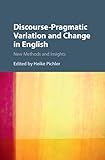Discourse-pragmatic variation and change in English : new methods and insights / edited by Heike Pichler.
Material type: TextPublication details: Cambridge ; New York : Cambridge University Press, 2016.Description: 304 p. ; 24 cmISBN:
TextPublication details: Cambridge ; New York : Cambridge University Press, 2016.Description: 304 p. ; 24 cmISBN: - 9781107055766 (hardback)
- P99.4.P72 D57 2016
| Item type | Current library | Home library | Call number | Copy number | Status | Barcode | |
|---|---|---|---|---|---|---|---|
 Books
Books
|
قاعة الكتب - الدور الثاني | المكتبة المركزبة الجديدة - جامعة القاهرة | 427 D6114 (Browse shelf(Opens below)) | C.1 | Available | 01000110204571000 |
Browsing المكتبة المركزبة الجديدة - جامعة القاهرة shelves Close shelf browser (Hides shelf browser)
Includes bibliographical references ( p267 - 294) and index.
Machine generated contents note: List of figures; List of tables; Notes on editor and contributors; Acknowledgements; List of abbreviations; Introduction: discourse-pragmatic variation and change Heike Pichler; 1. Using the corpus-driven method to chart discourse-pragmatic change Gisle Andersen; 2. Practical strategies for elucidating discourse-pragmatic variation Cathleen Waters; 3. Uncovering discourse-pragmatic innovations: 'innit' in Multicultural London English Heike Pichler; 4. Innovation, 'right'? Change, 'you know'? Utterance-final tags in Canadian English Derek Denis and Sali A. Tagliamonte; 5. Antecedents of innovation: exploring general extenders in conservative dialects Sali A. Tagliamonte; 6. Quotatives across time: West Australian English then and now Celeste Rodri;guez Louro; 7. The role of children in the propagation of discourse-pragmatic change: insights from the acquisition of quotative variation Stephen Levey; 8. Register variation in intensifier usage across Asian Englishes Robert Fuchs and Ulrike Gut; 9. The use of referential general extenders across registers Suzanne Wagner, Ashley Hesson and Heidi Little; 10. Constructing style: phonetic variation in quotative and discourse particle 'like' Katie Drager; Epilogue: the future of discourse-pragmatic variation and change research Jenny Cheshire.
"This volume brings together key players in discourse variation research to offer original analyses of a wide range of discourse-pragmatic variables, such as 'like', 'innit', 'you get me', and 'at the end of the day'. The authors introduce a range of new methods specifically tailored to the study of discourse-pragmatic variation and change in synchronic and longitudinal dialect data, and provide new empirical and theoretical insights into discourse-pragmatic variation and change in contemporary varieties of English. The volume thus enhances our understanding of the complexities of discourse-pragmatic variation and change, and encourages new ways of thinking about variability in discourse-pragmatics. With its dual focus on presenting innovative methods as well as new results, the volume will provide an important resource for both newcomers and veterans alike in the field of discourse variation analysis, and spark discussions that will set new directions for future work in the field.
"which investigates the use of innit and other negative-polarity interrogative tags in a socially stratified corpus of contemporary London English. By closely investigating variants' positional, scopal, functional and social properties, Pichler uncovers that innit and a small number of its derivationally-equivalent co- variants are rapidly innovating in this variety. Their use is no longer restricted to right-periphery, clause-final positions but extends to the clausal left-periphery and positions adjacent to left-dislocated and lone noun phrases.
There are no comments on this title.




